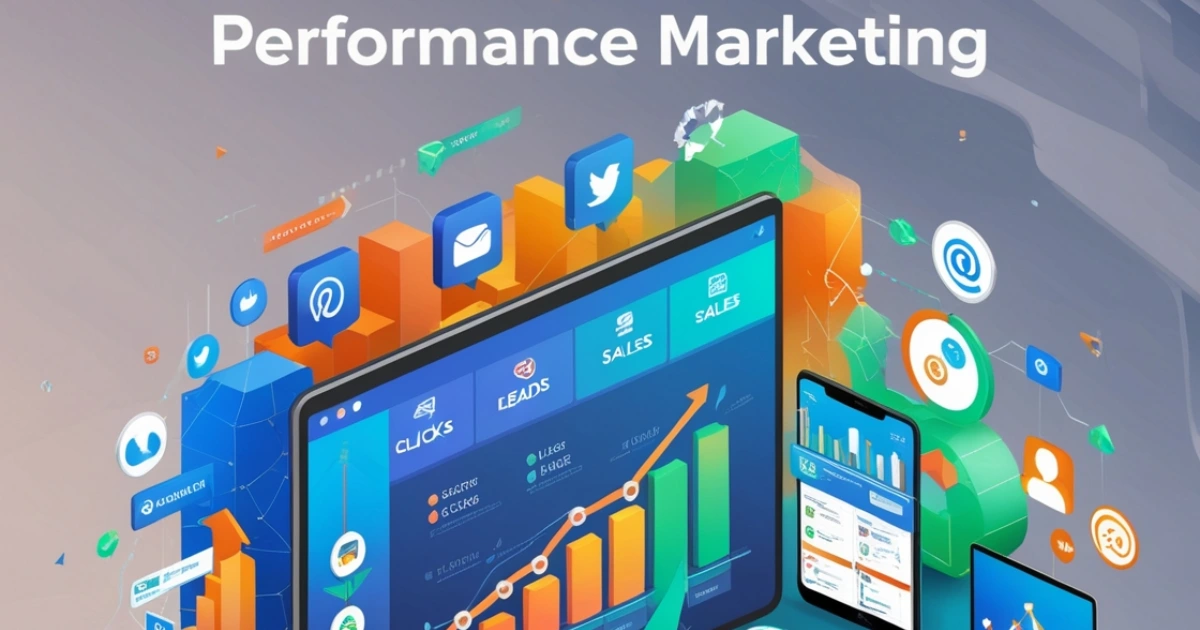Performance marketing is changing everything by which businesses achieve performance or results, offering you results-oriented returns.
What is Performance Marketing?
Performance marketing is the practice wherein spending is done only on digital ads for which the spend is action-oriented—clicks, leads, sales, etc.—and not on ad placements themselves. Thus, it assures measured outcomes through any kind of ad spend and is low-risk-high-reward.
Performance marketing is unlike traditional marketing as it involves pre-specified outcomes, so it promises ROI. The main benefits the business reaps include proper management of its budget, better-targeted audiences, and measurable results.
How Does Performance Marketing Work?
There are three key players in this game called performance marketing:
- Advertisers
- The brands that need to optimize performance metrics.
- Publishers or Partners
- Affiliates, influencers, or platforms promoting an advertiser’s offerings.
- Tracking Networks
- Tools that measure and attribute action to the right partner.
A tracking network begins with first defining a goal, finding appropriate partners, and using unique tracking codes or URLs to track performance. There is maximum efficiency from a result-based payout model.
Steps to Successful Performance Marketing Strategy
1. Well-defined Goals for Defining
Start by knowing what you hope to achieve from the marketing activity; for instance, you could need brand awareness, increased sales, or lead generation. You are targeting lead generation; let’s assume you need 1,000 new leads within a certain timeframe.
2. Appropriate Right Partners to Choose
Study and partner with those who will align to your objectives. There are many types of partners including influencers, affiliates, and publishers. Agree on an appropriate payment structure for your partners, such as CPC or CPA.
3. Utilize Unique Tracking Links
Tag tracking IDs or UTMs in order to measure and attribute the conversion correctly to partners. Most businesses use automation when tracking to avoid errors and scale the processes.
4. Campaign Optimization
Analyze campaigns regularly to fine-tune the strategy. Change messaging, visual elements, and the types of partners to optimize output.
Types of Performance Marketing Channels
- Affiliate Marketing
- The partner makes a commission for every sale or conversion generated.
- Influencer Marketing
- Work through influencers to reach your brand in their audience.
- Search Engine Marketing (SEM)
- This channel places ads on search engines and pays only for each click or conversion.
- Social Media Marketing
- Reach your target audience on Facebook and Instagram and pay for desired actions.
- Native Advertising
- Bake ads into content to ensure higher engagement.
Measuring Performance Marketing Success
To measure success, track metrics based on your campaign’s objectives. Common pricing and measurement models include:
- Cost Per Acquisition (CPA): Paying for each sale or conversion.
- Cost Per Click (CPC): Paying for each click on your ad or link.
- Cost Per Lead (CPL): Compensation for new leads.
- Cost Per Impression (CPM): This is the compensation for every 1,000 ad impressions.
For instance, if the campaign is lead generation, then CPL would be more appropriate. Tools such as tracking software ensure proper attribution and, therefore, improve the ROI.
Tools to Take Your Performance Marketing to the Next Level
- Everflow
- Track partners, referrals, and conversion attributions with a click.
- Impact
- Simplify your partnership process—from onboarding to payouts.
- LeadDyno
- Streamline ease in affiliate link creation and tracking for your campaigns.
The tools help businesses to better their efficiency and scale the marketing.
Top Industries in Performance Marketing
Performance marketing is applied across industries, but retail is at the top with 76% of total spend. Finance, travel, and automotive are some of the other industries that get good payback. But the bottom line is to get the right partners and make a plan for your industry.
Performance marketing is proven to be a cost-effective way to deliver measurable results. Clear goals, the right partners, and advanced tracking tools will maximize ROI and drive meaningful growth.
To explore performance marketing solutions tailored for you, click here.




